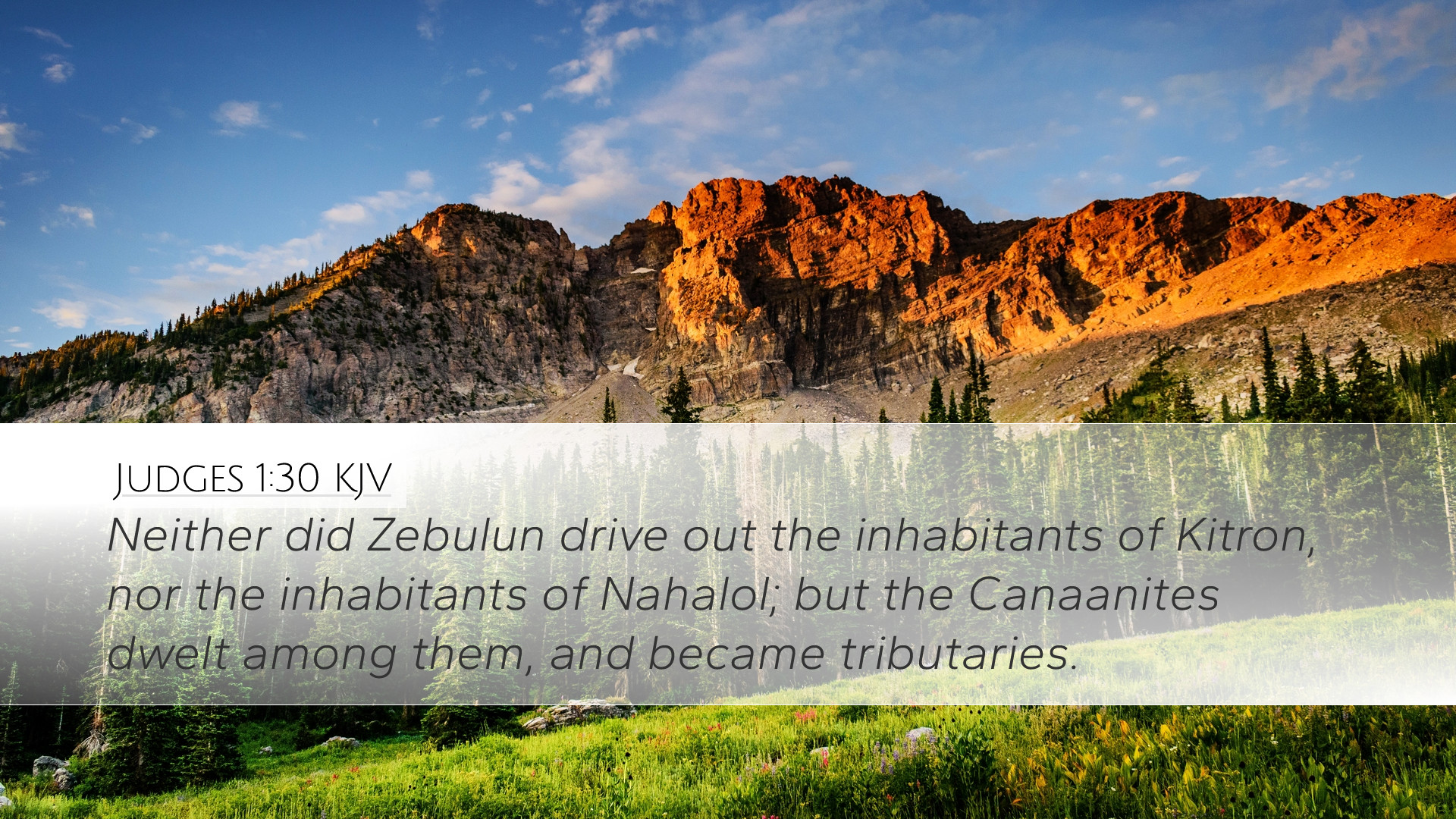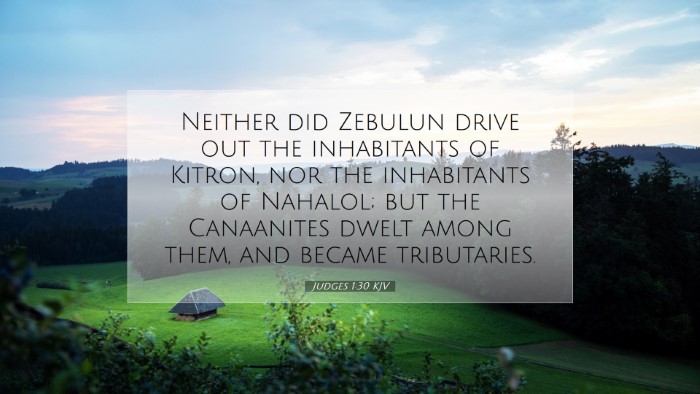Commentary on Judges 1:30
Judges 1:30 states, “Neither did Zebulun drive out the inhabitants of Kitron, nor the inhabitants of Nahalol; but the Canaanites dwelled among them, and became tributaries.” This verse captures the complexities and challenges faced by the tribes of Israel during their conquest of Canaan. A synthesis of insights from notable biblical commentators provides a deeper understanding of this passage.
Overview of the Context
The Book of Judges presents a cycle of sin, oppression, repentance, and deliverance. After Joshua's leadership, the Israelites entered a period where each tribe was responsible for taking possession of their allotted land. However, their failure to fully drive out the Canaanite inhabitants led to a compromise of their faith and the eventual idolatries that plagued the nation of Israel.
Insights from Matthew Henry
Matthew Henry explains that the failure of Zebulun to drive out the Canaanites signifies a broader theme of disobedience and compromise among the Israelite tribes. He highlights that:
- Spiritual Indifference: Henry notes that Zebulun's inhabitants were not motivated to establish a holy separation from the Canaanites. Their inaction represents a neglect of God's command, as they were supposed to be agents of God's judgment against these nations.
- Consequences of Compromise: By allowing the Canaanites to remain, Zebulun faced long-term implications, which would lead to spiritual and moral degradation. Henry warns that such compromises can weaken a community's faith.
- Tributary Relationships: Henry indicates that the Canaanites becoming tributaries could suggest a reliance on oppression rather than embracing God's full promise for Israel. This reflects a failure to fully experience God's provision and freedom.
Insights from Albert Barnes
Albert Barnes provides a practical view of the implications of Zebulun's actions:
- Complicated Relationships: Barnes elaborates on how these mixed relationships with the Canaanites brought about a troubling coexistence, where the Israelites were entangled with those who did not share their covenantal identity.
- Lessons in Leadership: He stresses the importance of decisive and godly leadership within communities. The failure of Zebulun serves as a cautionary tale for leaders today, demonstrating the potential pitfalls of complacency.
- Economic Dependency: The tributary status of the Canaanites underscores issues of economic dependence. Barnes suggests that such arrangements are contrary to the ideal of a nation wholly devoted to God, and it can lead to moral corruption.
Insights from Adam Clarke
Adam Clarke adds a scholarly perspective, emphasizing the historical and cultural implications:
- Historical Context: Clarke points out that Zebulun's inaction can be understood as part of a larger historical pattern rather than an isolated failure. The tribes often faced formidable enemies and internal divisions that hindered their efforts.
- Divine Sovereignty: He emphasizes that despite their failures, God's sovereignty remained intact. Clarke asserts that God's purposes are ultimately fulfilled, offering hope for restoration and future deliverance.
- Symbolic Interpretation: Clarke interprets the Canaanites as symbols of sin and opposition to God. For modern readers, this serves as a reminder to confront and eliminate sin, refusing to allow it to coexist within one’s life or community.
Theological Reflections
This passage is rich with theological implications that resonate with contemporary audiences:
- Holiness and Separation: The call for holiness and separation from sinful practices remains relevant. The Israelites' failure is a warning against the dangers of compromising biblical standards in pursuit of acceptance or ease.
- Restoration and Hope: While Judges records a cycle of failure, it also points to the hope of redemption. Just as God was present with His people then, He remains active today, willing to restore those who return to Him.
- Faithfulness in Struggle: The scripture invites modern readers to be vigilant in their spiritual walk, understanding that struggles and battles may arise, but God’s call is towards faithfulness despite the challenges.
Application for Today’s Believers
This commentary encourages pastors, students, theologians, and Bible scholars to reflect on the spiritual lessons from Zebulun’s experience:
- Assessing our Compromises: Believers are encouraged to examine areas in their lives where they may have settled for less than God’s best, allowing unhealthy influences to remain rather than confronting them.
- Leadership and Responsibility: The passage challenges leaders to guide their communities toward complete obedience to God’s Word, actively working to protect their flocks from spiritual encroachments.
- Hope and Renewal: Lastly, this text uplifts, reminding believers that failure is not the end. God's mercies are new every morning, and He invites His people to walk in the fullness of His grace.


